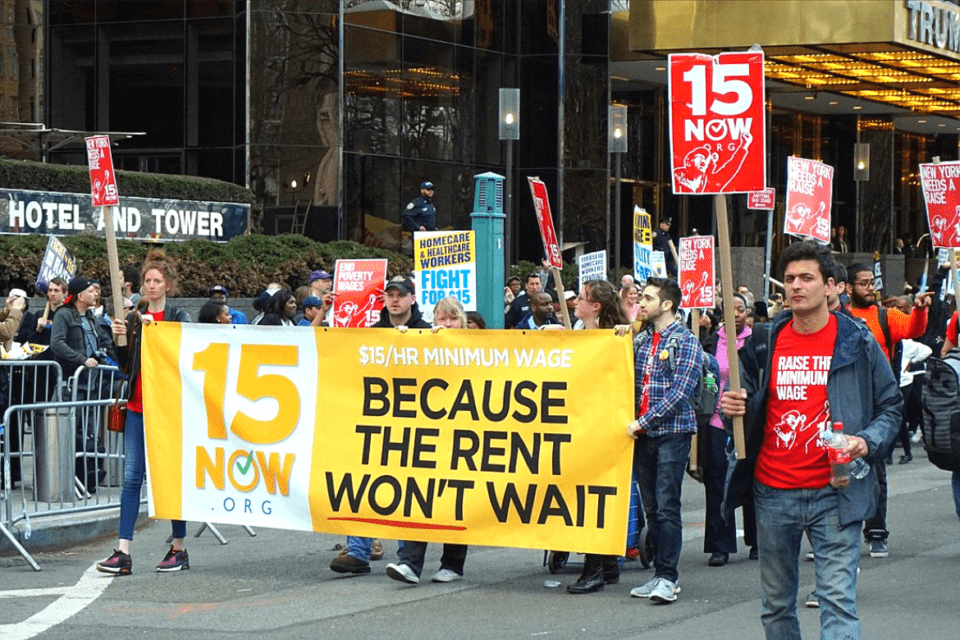By Andrew Pfaff
What economic policy most helps the American people? There are many ideas on how to best answer that question, but two ideologies tend to stand out: capitalism and socialism. Numerous variations of both principles exist, as well as many misconceptions.
As defined by Merriam-Webster, capitalism is “an economic system characterized by private or corporate ownership of capital goods, by investments that are determined by private decision, and by prices, production and the distribution of goods that determined mainly by competition in a free market”. Socialism is defined as “any various economic and political theories advocating collective or governmental ownership and administration of the means of production and distribution of goods”.
There are many ideas on what policy would best help the American people and how to implement each. One common policy discussed is ‘democratic socialism’. Ideas of how ‘democratic’ socialism would work or how it differs from traditional socialism seem to vary, but the most common association points to Nordic countries as an example. Nordic countries have an open market system with high taxation to pay for welfare programs, such as free education and healthcare—which is conflicting as these programs are paid for through taxes and are not accurately described as “free”. Furthermore, this system is ultimately poorly described as ‘democratic socialism’ and better described as ‘welfare capitalism‘.
Welfare capitalism is defined as “capitalism characterized by concern for the welfare of various social groupings expressed usually through social security programs, collective bargaining agreements, state industrial codes, and other guarantees against insecurity.” The United States of America is commonly viewed as a capitalist society, but with taxation and regulation it is not a true free market and is best described as a welfare capitalist society. The main difference between the Nordic version of democratic socialism and American capitalism is the amount of taxes imposed on the people.
How to Improve Economic Stability?
The goal of changing economic policy to help the American people would be difficult to achieve by taking more money from the people. A common method for attempting to improve economic stability has been through increasing minimum wage. Since minimum wage increases give more money to the lowest earning workers, they are often viewed as beneficial—but they have some unintended consequences.
Minimum wage increases can be especially difficult for small businesses to cope with; this is unfortunate, but it is not the primary danger. A forced increase in worker compensation can cause a reaction called ‘wage push inflation’. Not every business would be forced to increase prices to goods and services from higher wages, but some would. This can cause a cascading effect from suppliers, distributors and a multitude of other costs to operation within business to all but ensure a rise in the cost of goods and services across all industries. This effect not only mitigates the benefit seen from low earners, but affects all working people, further damaging the the buying power of all Americans. Unfortunately, wage mitigation is not the only concern as another action businesses may take is cutting hours or positions. The goal set for wage increases by force has the potential to fall short of the mark for many or worsen an already unfavorable situation.
Another commonly proposed way to help the economy is through tax breaks for individuals and/or businesses. Tax breaks for individuals help people by allowing them to keep more of the money they earn for themselves, but must be done sparingly to avoid adverse effects on national welfare and security. Tax breaks for business are sometimes believed to have a trickle down effect to the employees. Some businesses utilize the tax burden relief to increase employee wages, but this is not a guarantee or the most common outcome. The benefit from reducing taxes on business generally comes in the form of investment. When a business keeps more of its profit, it has more money to invest in the company to further expand the business. This leads to more job creation and growth within the economy, but also needs to be done carefully for the same reasons.
A Different Approach to Benefit Everyone
What economic policy most benefits the American people? Economic policy tends to be a balancing act between taxation for social welfare and national security, and reduced taxation for market growth. As the world grows smaller through technology, there is an increasing effect from global markets and balancing a national economy becomes increasingly difficult. We no longer live in a world where renaming or repackaging old, ineffective or failed policies will benefit the people. In this time of rapid change, new policies are needed for a new world to sustain economic stability for Americans.
I would like to propose a policy to save the free market, increase the buying power of lower wage workers, and avoid increasing taxation as well as inflation. Wage incentives is a program in which businesses can pay employees higher wages without additional cost by earning a tax reduction based on company compensation versus the federal minimum wage. One way to look at wage incentives is to take the idea of trickle down economics and put in place a method to make it a practice that benefits employees as well as employers.
If a business has 10 employees with each earning $15/hour working full time, the business could take the difference between the current federal minimum wage of $7.25/hour and the $15/hour the workers are paid, to receive a $6.25/hour difference. The difference would be multiplied by the affected workers to see a value of $62.50/hour. This figure would be further multiplied by hours worked at 40 per week and 52 weeks for a difference of $130,000 paid over federal minimum wage. Under a wage incentive program, businesses would be allowed to claim the difference as a corporate tax deduction. Wage incentives would allow businesses to pay higher wages to those who need it the most without additional cost to annual earnings.
Unfortunately, some regulations would have to be put in place to allow this policy to operate fairly and without abuse. As larger businesses pay more taxes based off a taxable earning percentage, this would allow them more power to implement and abuse these policies. To avoid an unfair advantage to large corporations, the deductible percentage would need to be tied to volume of employment. Larger companies would only be able to reduce their taxable percentage from 21% to 18%, for example. Small business may be able to deduct virtually all corporate taxation to achieve the same benefit.
Another limitation necessary to maintain stability within the market and limit abuse would come in limitations on the level of qualifying earnings, where any earning over a set amount would no longer be eligible for deduction. This restriction would allow a business to write off the earnings of all employees between the set minimum wage and $15/hour.
In 2015, corporate taxes made up roughly 10% of the federal budget and, balanced properly, should not affect the intake of federal taxation over 2%. This would be further reduced by the higher intake in personal income taxes and less reliance on welfare programs. To determine the best rates and regulations would take careful consideration, but with proper implementation could help restore economic stability to many Americans.
The goal of wage incentives is to reduce the wage gap in America and broaden the buying power of the American people without negatively affecting the market. Wage incentives implemented properly would benefit the working class, leave businesses unharmed, and have a minimum impact on taxes received by the federal government.





2 comments
… [Trackback]
[…] Read More on on that Topic: thelibertarianrepublic.com/wage-incentives-a-proposal-to-help-save-the-free-market/ […]
… [Trackback]
[…] Find More here on that Topic: thelibertarianrepublic.com/wage-incentives-a-proposal-to-help-save-the-free-market/ […]